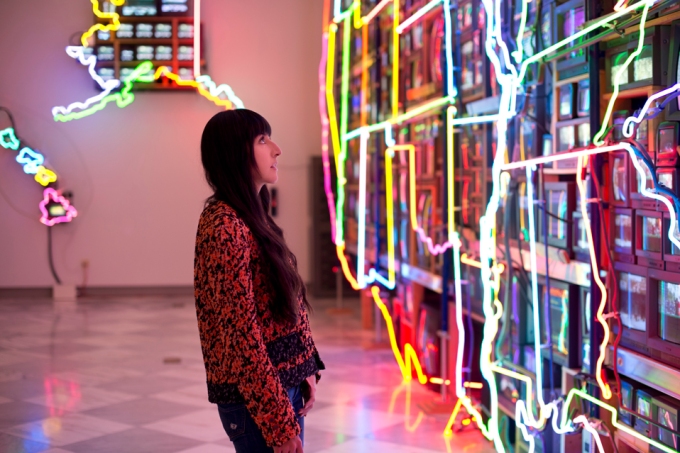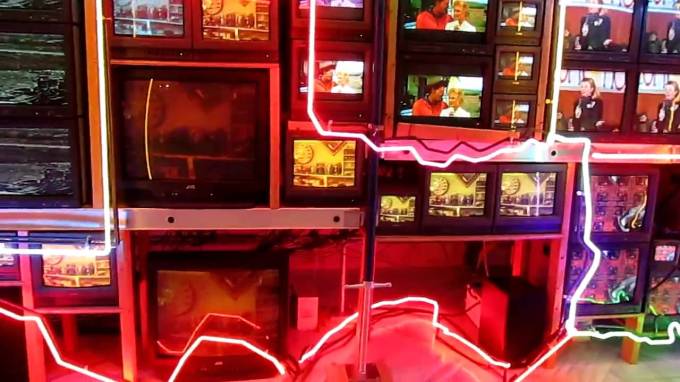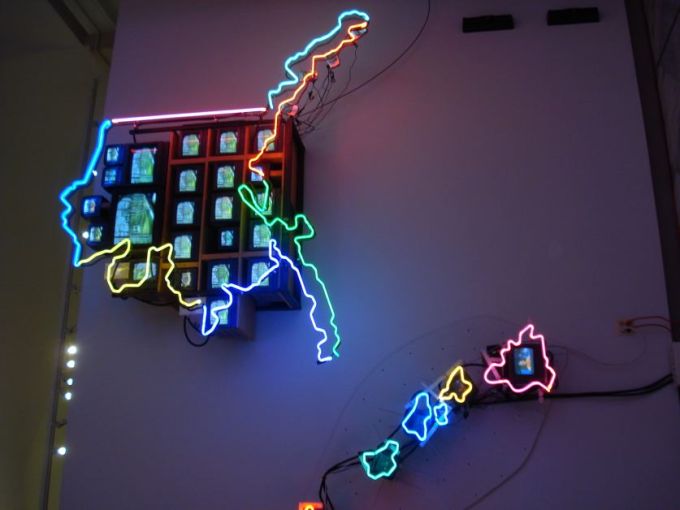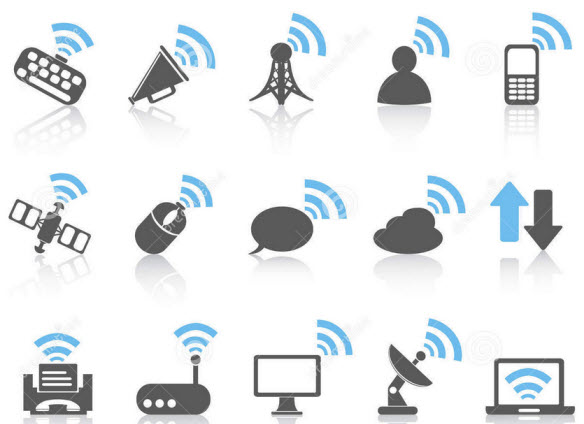Nam June Paik was a Korean American artist. He worked with a variety of media such as televisions and is considered to be the founder of video art. Paik was also credited with an early usage of the term "electronic super highway" in application to telecommunications.


Electronic superhighway was created in 1995 during the neo dada period. Neo Neo-Dada artists often encouraged viewers to look beyond traditional aesthetic standards and interpret meaning through a process of critical thinking generated by contradictions, absurd juxtapositions, coded narratives, and other mixed signals, rather than the internal emotions. Paik’s Fluxus works undermined accepted notions of musical composition and performance. This same irreverent spirit informed his use of television.

This work consists 336 television, 50 dvd player, 3750 feet of cable, 575 feet of multi coloured neon tubing. The neon tubing is a testament to the ways media define one man's understanding of diverse nation. Also, the different colours reminds all of us that individual states still have distinct identities and culture, even in today’s information age.


Upon closer inspection, all the television are playing different shows and videos in different part of the world. Below, are some examples of movies and videos played during the exhibition to represent a particular country.
~Missouri: playing the movie "Meet Me In St. Louie"
~ Kansas: playing "The Wizard of Oz"
~ Idaho: shows potatoes. Just potatoes. Over and over again.
~ Kentucky: scenes from the Kentucky Derby
~ Indiana: scenes from the Indy 500
~ Iowa: politicians campaigning during the Iowa caucuses
~ Illinois: rapid scenes of Chicago with an occassion photo of Lincoln
~ Colorado: amateur sports
~ Mississippi: scenes from the civil rights movement
~ Rhode Island: has a little tiny television
~ Hawaii: scenes from "South Pacific"?
~ Alaska: ice and snow
~ South Dakota: George McGovern
~ Kansas: playing "The Wizard of Oz"
~ Idaho: shows potatoes. Just potatoes. Over and over again.
~ Kentucky: scenes from the Kentucky Derby
~ Indiana: scenes from the Indy 500
~ Iowa: politicians campaigning during the Iowa caucuses
~ Illinois: rapid scenes of Chicago with an occassion photo of Lincoln
~ Colorado: amateur sports
~ Mississippi: scenes from the civil rights movement
~ Rhode Island: has a little tiny television
~ Hawaii: scenes from "South Pacific"?
~ Alaska: ice and snow
~ South Dakota: George McGovern

Paik's intention was to address social issues along with media technologies that would become increasingly prevalent in American society. Media technologies should also not be used to discourse social problems such as racial segregation, modernization of the economy and environmental pollution. Therefore, Paik's report forecasted the emergence of what he called a "broadband communication network or “electronic super highway”—comprising not only television and video, but also “audio cassettes, telex, data pooling, continental satellites, micro-fiches, private microwaves and eventually, fiber optics on laser frequencies.” By the 1990s, Paik’s concept of an information “superhighway” had become associated with a new “world wide web” of electronic communication.


I think there are pros and cons when we talk about technology and i have mixed feelings about technology. But there's one thing for sure, i think that technology can be useful but it may also affect us in a bad way if we do not know how to manage our time and make use of it well. Most people take advantage of technology and hence they don't really come out of their comfort zone which i think i have a point. With technology, most of us are like living under a rock. WE have no clue what's happening and that only the only that's blinding us from reality is the media. And most of the things that are published by the media are not really true because we only hear one side of the story. It's just like the theory of 'allegory of the cave" by Plato.
bibliography:
- https://www.youtube.com/watch?v=p16JxNV90SU
- https://www.khanacademy.org/humanities/global-culture/conceptual-performance/a/paik-electronic-superhighway
-

No comments:
Post a Comment